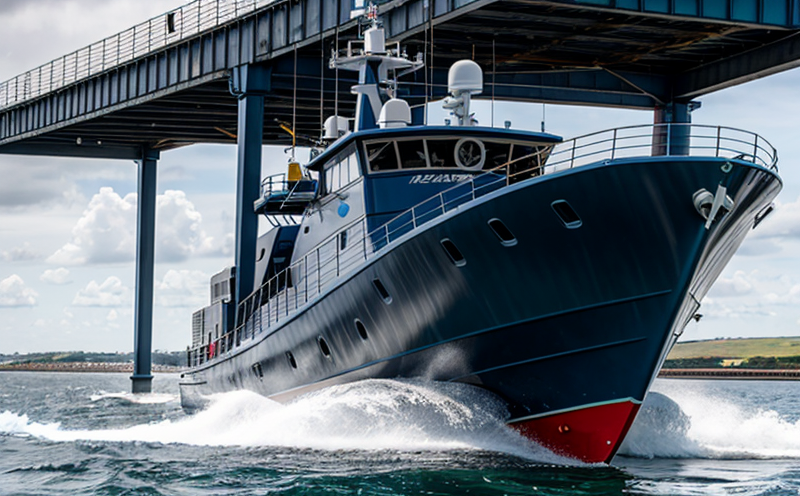ISO 8665 Marine Propulsion Engine Performance Testing
The ISO 8665 standard is a cornerstone in marine engineering and ship equipment testing. This international standard provides detailed procedures for determining the performance characteristics of marine propulsion engines, ensuring that they meet stringent quality and safety standards. Compliance with this standard is essential for manufacturers aiming to ensure their products are reliable and safe.
The process involves several critical steps: engine installation, calibration, fuel injection system checks, exhaust gas analysis, and finally, performance testing under controlled conditions. The tests are designed to evaluate the efficiency and durability of the propulsion systems in real-world scenarios. This ensures that ships can operate safely and efficiently across various maritime environments.
The standard also emphasizes the importance of using appropriate test rigs capable of simulating operational conditions accurately. These rigs must be able to replicate the stresses, pressures, and temperatures encountered during actual operation. The instrumentation used should provide precise measurements, which are crucial for accurate performance assessment.
ISO 8665 is particularly relevant in sectors like shipbuilding and marine maintenance where compliance with international standards ensures that products meet global safety and environmental regulations. For instance, it helps manufacturers ensure their engines comply with emissions control requirements set by various maritime agencies worldwide.
The testing process involves rigorous checks on multiple parameters including fuel consumption rates, power outputs, exhaust gas composition, noise levels, and vibration patterns. These metrics are critical in assessing the overall performance of marine propulsion systems. Properly conducted tests not only enhance product quality but also contribute to reducing operational costs by identifying potential issues early.
Furthermore, this standard plays a vital role in fostering innovation within the industry by providing consistent benchmarks against which new technologies can be evaluated. By adhering strictly to these standards during development stages, manufacturers can ensure their innovations are both safe and effective before they reach market readiness.
Why It Matters
The importance of ISO 8665 cannot be overstated for any organization involved in the design, manufacture, or maintenance of marine propulsion engines. Adhering to this standard ensures that all aspects of engine performance are thoroughly evaluated under controlled conditions similar to those experienced during actual operations.
By following these guidelines meticulously, companies can enhance their reputation as reliable suppliers who prioritize safety and quality above all else. This commitment translates into increased customer trust and loyalty, which is especially crucial given the competitive nature of the shipping industry today.
In addition to fostering trust among customers, compliance with ISO 8665 also helps reduce operational risks associated with subpar equipment. When every component works efficiently as designed, vessels operate more safely and reliably, minimizing incidents that could lead to accidents or environmental damage.
The standard also supports sustainable practices by promoting the use of cleaner fuels and advanced technologies aimed at reducing emissions. As global regulations become increasingly stringent regarding environmental impact, having certified compliance with ISO 8665 becomes an attractive feature for potential buyers seeking environmentally responsible partners.
Benefits
- Enhanced reliability and safety of marine propulsion systems.
- Promotes consistent benchmarking across different manufacturers.
- Increases customer trust through proven adherence to international standards.
- Fosters innovation by providing a framework for evaluating new technologies.
- Reduces operational risks due to substandard equipment.
- Sustains sustainable practices by encouraging cleaner fuel usage and emission reductions.
- Improves overall efficiency of marine vessels through optimized engine performance.
Industry Applications
| Application Area | Description |
|---|---|
| Shipbuilding | Involves designing and manufacturing ships that comply with ISO 8665 standards. |
| Maintenance & Repairs | Ensuring existing engines are serviced according to the specified performance parameters. |
| New Product Development | Testing new propulsion systems before they enter mass production or market. |
| Regulatory Compliance | Making sure that all products meet international maritime regulations and standards. |
| Environmental Impact Assessment | Evaluating the environmental implications of using certain types of fuels on marine propulsion systems. |
| Operational Efficiency Improvement | Identifying ways to make vessels more fuel-efficient through improved engine performance. |





